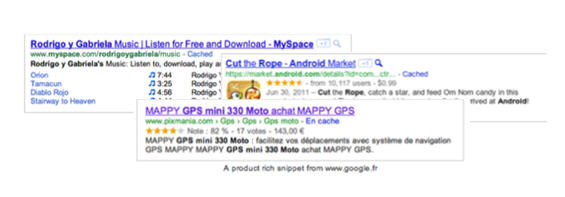Schema.org is a set of recommendations from top search engines Yahoo!, Google, Bing and Yandex to improve the quality of search results. Originally published in June 2011, it is a major collaboration of the big search providers to standardize the optimal method of adding microdata to your websites. Until then, there were many different syntaxes and no cohesion of the meaning of the data (semantics). Website owners and publishers can take advantage of this recommendation by adding HTML tags (microdata) to the content of your webpages.
In a recent study by SearchMetrics ( see the request download PDF ), they found many considerable impact.
- Pages with schema.org integrations rank better by an average of four positions compared to pages without schema.org integrations (link)
- Only 0.3% of domains in their sample included schema.org
- Google enhances search results with schema.org markups in more than 36% of keyword queries
- Movie, Offer, TVSeries and Review were the item types that most often ended up generating rich snippets in the SERPs
Rich Snippets
Rich snippets are extra lines of information shown to users in the search results. RIch snippets are created by the search engines for some types of structured data, like microdata, RDFa or Schema.org markup. The extra line of information is meant to provide extra information to the user to help them decide to go to that website. It could the 5 star rating, the price or dates of events. Google shows this extra information for approximately 10 different types of objects.
For things like Products, People or Local Businesses, Google will show an excerpt (e.g. reviews, price, picture) of what’s contained in the page. These rich snippets have shown a greater click through rate and therefore it translates into a increase of traffic. Here are some samples.

Schema.org is easier for Publishers
While metadata has existed from beginning of the HTML standard, schema.org is a single vocabulary and markup syntax that is supported by the major search engines. This means webmasters no longer have to make tradeoffs between syntax nor do they have implement multiple vocabularies. This saves time and improves the effectiveness.
Schema.org is easier for Search Engines
The justification for schema.org is that it makes it easier for the search engines to understand and categorize your web content. This makes them better able to match your content to users’ queries. As well, consolidating on a single standard means less work for them.
If you want to start on this now, have a look at our Schema.org Publishing tool – currently in private beta.
